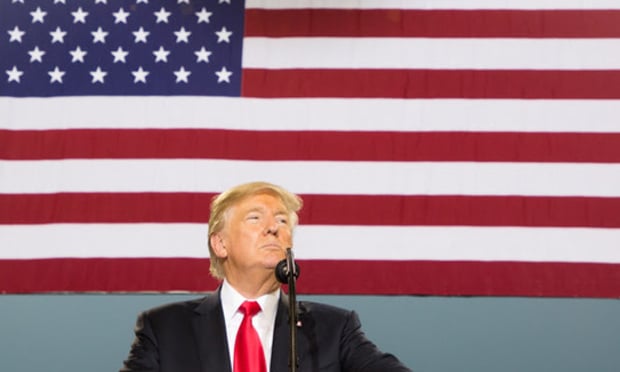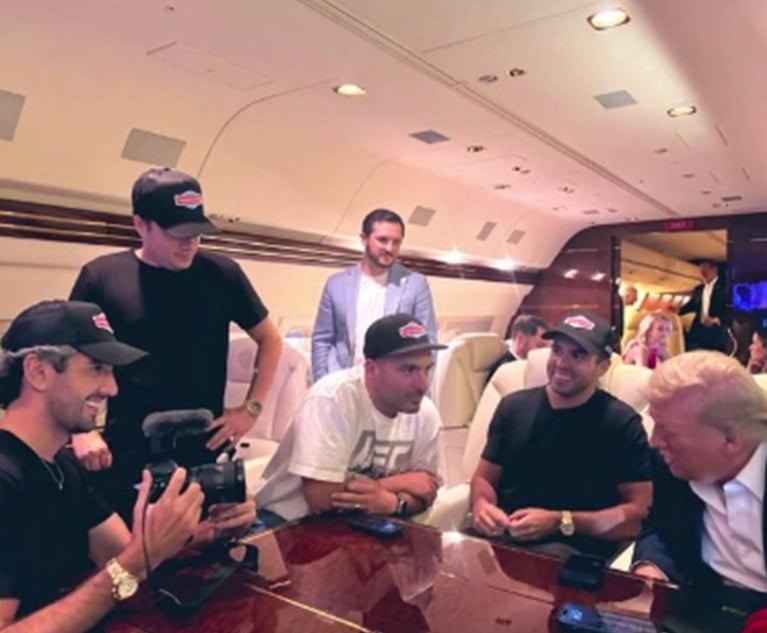How Lawyers Would Advise the Anonymous NYT Op-Ed Writer (and the White House)
The Trump administration's hunt for the identity of the anonymous NYT op-ed writer raises a host of workplace issues. Should the person lie if he or she is confronted? Are there whistleblower protections?
September 10, 2018 at 12:35 PM
7 minute read
 President Donald Trump. Courtesy photo
President Donald Trump. Courtesy photo
The White House is scrambling to uncover the identity of the “senior official in the Trump administration” who penned a fiery op-ed for The New York Times describing the inside resistance to the president and his agenda.
The opinion piece went viral and the hunt began immediately within the administration to uncover the writer. President Donald Trump on Twitter questioned whether the op-ed was “treason,” and he called for a federal investigation by the U.S. Justice Department. Numerous senior officials—including Vice President Mike Pence and Nikki Haley, the United Nations ambassador—have denied writing the op-ed. Many officials have called on the writer to resign.
There are all sorts of workplace legal issues in play right now—both for the anonymous writer, who may be consulting a lawyer about job protections, and for the White House itself. The Trump administration should proceed with care to avoid creating a pattern of retaliation for future whistleblower cases, employment attorneys said in interviews.
We reached out to management-side lawyers, whistleblower advocates and others for a sense of some of the labor and employment issues that could be playing out behind the scenes. Here's a snapshot of what we learned. (And no, we did not uncover the identity of any lawyer advising the anonymous Trump official.)
To Lie or Not to Lie?
It's a complicated question. As the White House tries to find the writer, the official may face questions from a supervisor or the president himself, “Did you write this?”
No employment attorney interviewed said a client who lies would be a good thing, but they all acknowledged the dilemma. A truthful answer would certainly mean termination.
“I would not lie in any context,” said Fenwick & West partner Dan McCoy, who typically advises employers. “They might say it's none of your business. If you were to say that, it would heighten suspicion. Lying would give the employer one more reason to terminate. Not only did you pen that op-ed but you lied about it.”
If a Justice Department investigation is launched, any deception could expose the anonymous official to criminal prosecution for false statements. Lying in that instance means more than losing your job.
“Never lie,” said Jason Zuckerman, a whistleblower attorney in Washington. “From what I saw in the op-ed, the whistleblower has done nothing wrong by exposing their concerns about serious risks to national security and abuse of authority. But lying to investigators could land the whistleblower in serious jeopardy.”
Does the Writer Have Any Workplace Protections?
Yes, but they are limited, and it's not clear if they apply in this case. The First Amendment protects government employees when they are speaking as a private citizen, particularly if it's a matter of public concern. If the speech is part of their job duties, they can be fired for that speech.
McCoy said the writer—if his or her identity is exposed—doesn't have many protections to fall back on. The substance of the letter, he said, is not protected activity and the context could amount to insubordinate disparagement of a boss. The administration would likely have a right to terminate this individual, he said.
McCoy's advice to the op-ed writer: “Keep your head down and keep working.” To the employer, or in this case the Trump administration, McCoy offered this advice: “Don't give this more credit than it deserves. The story has a shelf life.” (Indeed, several administration officials reportedly urged Trump to walk away from the letter—essentially to just let it go and move on.)
David Laufman, former Justice Department lawyer, said the op-ed writer—if he or she is questioned—needs to have a lawyer present.
“Unless there is something else the government knows, nothing on the face (of the op-ed) gives rise to a legitimate criminal investigation in the first place,” Laufman said. “Be careful to tell the truth and not make false statements. Do not destroy any documents or records.”
Outside of any criminal investigative setting involving a federal agent, there are employment consequences depending on the standards of conduct at wherever the writer is employed. (There's no certainty the writer works at the White House.)
“It's improbable that a false denial would expose the official to criminal liability,” Laufman said. “Whether there are employment consequences under the agency's code of ethics or agreements they have signed is a separate question.”
The First Amendment “looms pretty large” for any government official whose speech did not reveal classified or otherwise protected information, Laufman said. “There are tensions with the First Amendment with any adverse action—even under some employment processes,” he said. “Private employers have broader latitude to terminate an employee trashing a CEO or the company writ large.”
McCoy said the New York Times op-ed writer would unlikely find any comfort in the First Amendment following any adverse employment action. “I don't think this person has First Amendment protection because of what they said,” McCoy said. “They aren't standing on the steps of the Supreme Court talking about Roe v. Wade. They are saying something insubordinate and negative versus a White House employee participating in some sort of protest. There the lines would be more blurry.”
The Whistleblower Considerations
Political appointees are not protected under the Whistleblower Protection Act and the writer—assuming he or she is a political appointee—would not be able to file a whistleblower claim, Zuckerman said.
Civil servants, on the other hand, could have a potential retaliation claim that could be brought to the U.S. Office for Special Counsel, an independent agency that enforces the federal whistleblower law and other prohibited personnel practices.
Zuckerman said the NYT op-ed writer should be prepared for what he called the “counter-punch and counter-attack. Think about whether there are any skeletons in your closet and get ready for negative press.”
He said whistleblowers can disclose concerns to oversight committees in Congress, but he cautioned that the Republican-controlled U.S. Senate and U.S. House would give no assurances of confidentiality. He predicted more whistleblowers will come forward if Democrats win control of the House in the midterms.
Even assuming the writer is not a whistleblower, how the Trump administration has acted in response to the publication of the letter could pose problems in the future.
McCoy said if the White House were his client, he would be concerned about aggressive steps reportedly being taken to find out who the writer is. Any future whistleblower, he said, could point to the circumstances to argue a pattern of retaliatory behavior.
Claire Sylvia, a Phillips & Cohen whistleblower lawyer in San Francisco, said the White House's push to uncover the writer's identity reminded her of tactics in the corporate arena.
“There have been a lot of examples where employers—when they get information from the whistleblower happening—the emphasis is on, 'Let's figure out who that person is,'” Sylvia said. “That reinforces a toxic workplace. Employees are afraid to raise issues when the company focuses on the messenger rather than the message.”
She added: “When whistleblowers raise concerns about violations, institutions and companies should listen to what they are saying and address the issue and not engage in a witch hunt.”
Read more:
One Challenge of Being a Career Government Official: Fall in Line or Quit?
Marketing Analyst Who Gave Trump the Finger Loses Suit Over Her Firing
Omarosa Tapes Could Mean 'Open Season on Privacy Rights' in the Workplace
Donald Trump's Twitter Bashing of Jeff Sessions Raises Hostile Work Questions
➤➤ Get employment law news and commentary straight to your in-box with Labor of Law, a new Law.com briefing. Learn more and sign up here.
This content has been archived. It is available through our partners, LexisNexis® and Bloomberg Law.
To view this content, please continue to their sites.
Not a Lexis Subscriber?
Subscribe Now
Not a Bloomberg Law Subscriber?
Subscribe Now
NOT FOR REPRINT
© 2025 ALM Global, LLC, All Rights Reserved. Request academic re-use from www.copyright.com. All other uses, submit a request to [email protected]. For more information visit Asset & Logo Licensing.
You Might Like
View All
Am Law 100 Lateral Partner Hiring Rose in 2024: Report


Trending Stories
- 1Uber Files RICO Suit Against Plaintiff-Side Firms Alleging Fraudulent Injury Claims
- 2The Law Firm Disrupted: Scrutinizing the Elephant More Than the Mouse
- 3Inherent Diminished Value Damages Unavailable to 3rd-Party Claimants, Court Says
- 4Pa. Defense Firm Sued by Client Over Ex-Eagles Player's $43.5M Med Mal Win
- 5Losses Mount at Morris Manning, but Departing Ex-Chair Stays Bullish About His Old Firm's Future
Who Got The Work
J. Brugh Lower of Gibbons has entered an appearance for industrial equipment supplier Devco Corporation in a pending trademark infringement lawsuit. The suit, accusing the defendant of selling knock-off Graco products, was filed Dec. 18 in New Jersey District Court by Rivkin Radler on behalf of Graco Inc. and Graco Minnesota. The case, assigned to U.S. District Judge Zahid N. Quraishi, is 3:24-cv-11294, Graco Inc. et al v. Devco Corporation.
Who Got The Work
Rebecca Maller-Stein and Kent A. Yalowitz of Arnold & Porter Kaye Scholer have entered their appearances for Hanaco Venture Capital and its executives, Lior Prosor and David Frankel, in a pending securities lawsuit. The action, filed on Dec. 24 in New York Southern District Court by Zell, Aron & Co. on behalf of Goldeneye Advisors, accuses the defendants of negligently and fraudulently managing the plaintiff's $1 million investment. The case, assigned to U.S. District Judge Vernon S. Broderick, is 1:24-cv-09918, Goldeneye Advisors, LLC v. Hanaco Venture Capital, Ltd. et al.
Who Got The Work
Attorneys from A&O Shearman has stepped in as defense counsel for Toronto-Dominion Bank and other defendants in a pending securities class action. The suit, filed Dec. 11 in New York Southern District Court by Bleichmar Fonti & Auld, accuses the defendants of concealing the bank's 'pervasive' deficiencies in regards to its compliance with the Bank Secrecy Act and the quality of its anti-money laundering controls. The case, assigned to U.S. District Judge Arun Subramanian, is 1:24-cv-09445, Gonzalez v. The Toronto-Dominion Bank et al.
Who Got The Work
Crown Castle International, a Pennsylvania company providing shared communications infrastructure, has turned to Luke D. Wolf of Gordon Rees Scully Mansukhani to fend off a pending breach-of-contract lawsuit. The court action, filed Nov. 25 in Michigan Eastern District Court by Hooper Hathaway PC on behalf of The Town Residences LLC, accuses Crown Castle of failing to transfer approximately $30,000 in utility payments from T-Mobile in breach of a roof-top lease and assignment agreement. The case, assigned to U.S. District Judge Susan K. Declercq, is 2:24-cv-13131, The Town Residences LLC v. T-Mobile US, Inc. et al.
Who Got The Work
Wilfred P. Coronato and Daniel M. Schwartz of McCarter & English have stepped in as defense counsel to Electrolux Home Products Inc. in a pending product liability lawsuit. The court action, filed Nov. 26 in New York Eastern District Court by Poulos Lopiccolo PC and Nagel Rice LLP on behalf of David Stern, alleges that the defendant's refrigerators’ drawers and shelving repeatedly break and fall apart within months after purchase. The case, assigned to U.S. District Judge Joan M. Azrack, is 2:24-cv-08204, Stern v. Electrolux Home Products, Inc.
Featured Firms
Law Offices of Gary Martin Hays & Associates, P.C.
(470) 294-1674
Law Offices of Mark E. Salomone
(857) 444-6468
Smith & Hassler
(713) 739-1250









